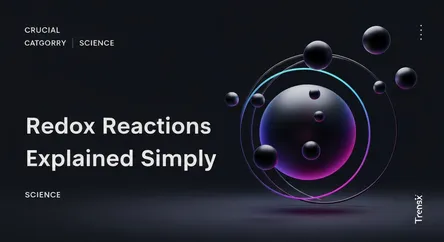Science
Redox Reactions Explained Simply

Understand redox reactions, the fundamental process of electron transfer that powers everything from batteries to breathing.
What is it?
A redox (reduction-oxidation) reaction is a fundamental type of chemical reaction involving the transfer of electrons between two species. One species loses electrons in a process called oxidation, while another species gains those electrons in a process called reduction. These two processes always occur simultaneously. The substance that loses electrons is known as the reducing agent, and the substance that gains electrons is the oxidizing agent. A simple way to remember this is the mnemonic OIL RIG: Oxidation Is Loss (of electrons), Reduction Is Gain (of electrons). This change in electron distribution results in a change in the oxidation states of the atoms involved.
Why is it trending?
Redox reactions are perpetually relevant in scientific research and technological advancement. Their principles are central to developing more efficient energy storage systems, such as lithium-ion batteries for electric vehicles and electronics, which function entirely through redox reactions. In environmental science, understanding redox reactions is crucial for water treatment and managing corrosion (like rust). Furthermore, ongoing biological and medical research continues to uncover the vital role of redox processes in cellular respiration, metabolism, and disease, making it a cornerstone concept for innovations in health and sustainable technology.
How does it affect people?
Redox reactions are integral to everyday life. The combustion of fuel in cars, the burning of wood in a fireplace, and the way our bodies convert food into energy through respiration are all complex redox processes. Common household products like bleach work by oxidizing substances to remove stains. The corrosion of metals, such as the rusting of an iron gate, is a visible, everyday example of a redox reaction. Even photosynthesis, the process by which plants create food from sunlight, is a series of redox reactions, fundamentally supporting most life on Earth.